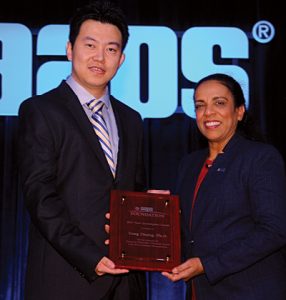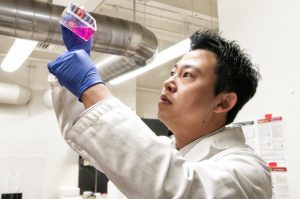Eliciting Anti-Cancer Immunity by Genetically Engineered Multifunctional Exosomes
Mol. Ther.
Exosomes are cell-derived nanovesicles involved in regulating intercellular communications. In contrast to conventional nanomedicines, exosomes are characterized by unique advantages for therapeutic development. Despite their major successes in drug delivery, the full potential of exosomes for immunotherapy remains untapped. Herein we designed genetically engineered exosomes featured with surfaced-displayed antibody targeting groups and immunomodulatory proteins. Through genetic fusions with exosomal membrane proteins, Expi293F cell-derived exosomes were armed with monoclonal antibodies specific for human T-cell CD3 and epidermal growth factor receptor (EGFR) as well as immune checkpoint modulators, programmed death 1 (PD-1) and OX40 ligand (OX40L). The resulting genetically engineered multifunctional immune-modulating exosomes (GEMINI-Exos) can not only redirect and activate T cells toward killing EGFR-positive triple negative breast cancer (TNBC) cells but also elicit robust anti-cancer immunity, giving rise to highly potent inhibition against established TNBC tumors in mice. GEMINI-Exos represent candidate agents for immunotherapy and may offer a general strategy for generating exosome-based immunotherapeutics with desired functions and properties.
Read More
Discovery of an NAD+ Analogue with Enhanced Specificity for PARP1
Chem. Sci.
Among various protein posttranslational modifiers, poly-ADP-ribose polymerase 1 (PARP1) is a key player for regulating numerous cellular processes and events through enzymatic attachments of target proteins with ADP-ribose units donated by nicotinamide adenine dinucleotide (NAD+). Human PARP1 is involved in the pathogenesis and progression of many diseases. PARP1 inhibitors have received approvals for cancer treatment. Despite these successes, our understanding about PARP1 remains limited, partially due to the presence of various ADP-ribosylation reactions catalyzed by other PARPs and their overlapped cellular functions. Here we report a synthetic NAD+ featuring an adenosyl 3'-azido substitution. Acting as an ADP-ribose donor with high activity and specificity for human PARP1, this compound enables labelling and profiling of possible protein substrates of endogenous PARP1. It provides a unique and valuable tool for studying PARP1 in biology and pathology and may shed light on the development of PARP isoform-specific modulators.
Read More
Expanding the Toolbox of Exosome-Based Modulators of Cell Functions
Biomaterials
Exosomes are cell-derived extracellular vesicles and play important roles in mediating intercellular communications. Due to their unique advantages in transporting a variety of biomolecules, exosomes have been emerging as a new class of nanocarriers with great potential for therapeutic applications. Despite advancements in loading chemotherapeutics and interfering RNAs into exosomes, active incorporation of protein molecules into exosomes remains challenging owing to their distinctive physicochemical properties and/or a lack of knowledge of cargo sorting during exosome biogenesis. Here we report the generation of a novel type of engineered exosomes with actively incorporated membrane proteins or soluble protein cargos, named genetically infused functionally tailored exosomes (GIFTed-Exos). Through genetic fusion with exosome-associated tetraspanin CD9, transmembrane protein CD70 and glucocorticoid-induced tumor necrosis factor receptor family-related ligand (GITRL) could be displayed on exosome surface, resulting in GIFTed-Exos with excellent T-cell co-stimulatory activities. By genetically linking to a CD9-photocleavable protein fusion, fluorescent protein mCherry, apoptosis-inducing protein apoptin, and antioxidant enzyme catalase could be effectively packed into exosomes for light-controlled release. The generated GIFTed-Exos display notable in vitro and in vivo activities for delivering distinct types of protein cargos to target cells. As a possibly general approach, GIFTed-Exos provide new opportunities to create exosomes with new functions and properties for biomedical research.
Read More
Site-Specific Antibody-Drug Conjugates with Variable Drug-to-Antibody-Ratios for AML Therapy
J. Control. Release
Random conjugations of chemotherapeutics to monoclonal antibodies result in heterogeneous antibody-drug conjugates (ADCs) with suboptimal pharmacological properties. We recently developed a new technology for facile generation of homogeneous ADCs by harnessing human CD38 catalytic domain and its dinucleotide-derived covalent inhibitor, termed ADP-ribosyl cyclase-enabled ADCs (ARC-ADCs). Herein we advance this technology by designing and synthesizing ARC-ADCs with customizable drug-to-antibody ratios (DARs). Through varying numbers and locations of CD38 fused to an antibody targeting human C-type lectin-like molecule-1 (hCLL-1), ARC-ADCs featuring DARs of 2 and 4 were rapidly generated via a single step with cytotoxic monomethyl auristatin F (MMAF) as payloads. In contrast to anti-hCLL-1 ARC-ADC carrying 2 drug molecules, anti-hCLL-1 ARC-ADC with a DAR of 4 shows highly potent activity in killing hCLL-1-positive acute myeloid leukemia (AML) cells both in vitro and in vivo. This work provides novel ADC candidates for combating AML and supports ARC-ADC as a general and versatile approach for producing site-specific ADCs with defined DARs.
Read More
A Bifunctional NAD+ for Profiling Poly-ADP-Ribosylation-Dependent Interacting Proteins
ACS Chem. Biol.
Protein poly-ADP-ribosylation (PARylation) is a heterogeneous and dynamic post-translational modification regulated by various writers, readers, and erasers. It participates in a variety of biological events and is involved in many human diseases. Currently, tools and technologies have yet to be developed for unambiguously defining readers and erasers of individual PARylated proteins or cognate PARylated proteins for known readers and erasers. Here, we report the generation of a bifunctional nicotinamide adenine dinucleotide (NAD+) characterized by diazirine-modified adenine and clickable ribose. By serving as an excellent substrate for poly-ADP-ribose polymerase 1 (PARP1)-catalyzed PARylation, the generated bifunctional NAD+ enables photo-cross-linking and enrichment of PARylation-dependent interacting proteins for proteomic identification. This bifunctional NAD+ provides an important tool for mapping cellular interaction networks centered on protein PARylation, which are essential for elucidating the roles of PARylation-based signals or activities in physiological and pathophysiological processes.
Read More
A Poly-ADP-Ribose Polymer-Based Antibody-Drug Conjugate
Chem. Sci.
Protein poly-ADP-ribosylation (PARylation) plays vital roles in many aspects of physiology and pathophysiology. This posttranslational modification is catalyzed by poly-ADP-ribose polymerases (PARPs) through additions of ADP-ribose from nicotinamide adenine dinucleotide (NAD+) to protein residues, forming linear or branched poly-ADP-ribose (PAR) polymers. In this study, we explored a new concept of utilizing functionalized PAR polymers for targeted drug delivery. This was achieved by rapid and efficient generation of auto-PARylated PARP1 with 3′-azido ADP-riboses and subsequent conjugations of anti-human epidermal growth factor receptor 2 (HER2) antibodies and monomethyl auristatin F (MMAF) payloads. This designed PARylated PARP1-antibody-MMAF conjugate could potently kill HER2-expressing cancer cells in high specificity. This proof-of-principle work demonstrates the feasibility of production of PAR polymer-based antibody-drug conjugate and its application in targeted delivery. The PAR polymer-based conjugates may lead to new types of therapeutics with potentially improved physicochemical and pharmacological properties.
Read More
A Humanized Antibody Inhibitor for Cathepsin L
Protein Sci.
Cathepsin L (CTSL) is a cysteine protease involved in a variety of physiological and pathological processes. Potent inhibitors against CTSL have long been sought for drug development. Due to insufficient specificity and suboptimal pharmacological properties for current CTSL inhibitors, novel agents are still required for selectively blocking CTSL activity. Here we generated a humanized antibody inhibitor of CTSL by genetically fusing the inhibitory propeptide of procathepsin L to the N‐terminus of the light chain of a humanized antibody. The resulting antibody fusion could be stably expressed and displays highly potent inhibition activity and specificity toward CTSL. This work demonstrates a new approach for the rapid generation of antibody inhibitors of CTSL. It can possibly be extended to create inhibitory antibodies targeting other cathepsin proteases, providing novel research and therapeutic tools.
Read More
Synthesis of Site-Specific Antibody-Drug Conjugates by ADP-Ribosyl Cyclases
Sci. Adv.
Most of the current antibody-drug conjugates (ADCs) in clinic are heterogeneous mixtures. To produce homogeneous ADCs, established procedures often require multiple steps or long reaction times. The introduced mutations or foreign sequences may cause high immunogenicity. Here, we explore a new concept of transforming CD38 enzymatic activity into a facile approach for generating site-specific ADCs. This was achieved through coupling bifunctional antibody-CD38 fusion proteins with designer dinucleotide-based covalent inhibitors with stably attached payloads. The resulting adenosine diphosphate–ribosyl cyclase–enabled ADC (ARC-ADC) with a drug-to-antibody ratio of 2 could be rapidly generated through single-step conjugation. The generated ARC-ADC targeting human epidermal growth factor receptor 2 (HER2) displays excellent stability and potency against HER2-positive breast cancer both in vitro and in vivo. This proof-of-concept study demonstrates a new strategy for production of site-specific ADCs. It may provide a general approach for the development of a novel class of ADCs with potentially enhanced properties.
Read More
Rational Design of a Humanized Antibody Inhibitor of Cathepsin B
Biochemistry
Cathepsin B (CTSB) is an abundant cysteine protease that functions in both endolysosomal compartments and extracellular regions. A considerable number of preclinical and clinical studies indicate that CTSB is implicated in many human diseases. Expression levels and activity of CTSB significantly correlate with disease progression and severity. Current inhibitors of CTSB are lack of adequate specificity and pharmacological activities. Through structure-guided rational design, we hereby designed and generated a humanized antibody inhibitor targeting human CTSB. This was achieved by genetically fusing the propeptide of procathepsin B, a naturally occurring inhibitor of CTSB, into heavy chain complementarity-determining region 3 (CDR3H) of Herceptin that is used in the clinic for the treatment of breast cancer. The resulting antibody-propeptide fusion displayed high specificity for inhibiting CTSB proteolytic activity at nanomolar levels. Pharmacokinetic studies in mice revealed a plasma half-life of approximately 42 h for this anti-CTSB antibody inhibitor, comparable to that of the parental Herceptin scaffold. This study demonstrates a new approach for the efficient generation of humanized antibody inhibitors with high potency and specificity for human CTSB, which may be extended to develop antibody inhibitors against other disease relevant cathepsin proteases.
Read More
Genetically Engineered Cell-Derived Nanoparticles for Targeted Breast Cancer Immunotherapy
Mol. Ther.
Exosomes are nanosized membranous vesicles secreted by a variety of cells. Due to their unique and pharmacologically important properties, cell-derived exosome nanoparticles have drawn significant interest for drug development. By genetically modifying exosomes with two distinct types of surface-displayed monoclonal antibodies, we have developed an exosome platform termed synthetic multivalent antibodies retargeted exosome (SMART-Exo) for controlling cellular immunity. Here, we apply this approach to human epidermal growth factor receptor 2 (HER2)-expressing breast cancer by engineering exosomes through genetic display of both anti-human CD3 and anti-human HER2 antibodies, resulting in SMART-Exos dually targeting T cell CD3 and breast cancer-associated HER2 receptors. By redirecting and activating cytotoxic T cells toward attacking HER2-expressing breast cancer cells, the designed SMART-Exos exhibited highly potent and specific anti-tumor activity both in vitro and in vivo. This work demonstrates preclinical feasibility of utilizing endogenous exosomes for targeted breast cancer immunotherapy and the SMART-Exos as a broadly applicable platform technology for the development of next-generation immuno-nanomedicines.
Read More
A Ribose-Functionalized NAD+ with Unexpected High Activity and Selectivity for Protein Poly-ADP-Ribosylation
Nat. Commun.
Nicotinamide adenine dinucleotide (NAD+)-dependent ADP-ribosylation plays important roles in physiology and pathophysiology. It has been challenging to study this key type of enzymatic post-translational modification in particular for protein poly-ADP-ribosylation (PARylation). Here we explore chemical and chemoenzymatic synthesis of NAD+ analogues with ribose functionalized by terminal alkyne and azido groups. Our results demonstrate that azido substitution at 3′-OH of nicotinamide riboside enables enzymatic synthesis of an NAD+ analogue with high efficiency and yields. Notably, the generated 3′-azido NAD+ exhibits unexpected high activity and specificity for protein PARylation catalyzed by human poly-ADP-ribose polymerase 1 (PARP1) and PARP2. And its derived poly-ADP-ribose polymers show increased resistance to human poly(ADP-ribose) glycohydrolase-mediated degradation. These unique properties lead to enhanced labeling of protein PARylation by 3′-azido NAD+ in the cellular contexts and facilitate direct visualization and labeling of mitochondrial protein PARylation. The 3′-azido NAD+ provides an important tool for studying cellular PARylation.
Read More
Reprogramming Exosomes as Nanoscale Controllers of Cellular Immunity
J. Am. Chem. Soc.
Exosomes are naturally occurring membranous vesicles secreted by various types of cells. Given their unique and important biological and pharmacological properties, exosomes have been emerging as a promising form of nanomedicine acting via efficient delivery of endogenous and exogenous therapeutics. Here we explore a new concept of utilizing endogenously derived exosomes as artificial controllers of cellular immunity to redirect and activate cytotoxic T cells toward cancer cells for killing. This was achieved through genetically displaying two distinct types of antibodies on exosomal surface. The resulting synthetic multivalent antibodies retargeted exosomes (SMART-Exos), which express monoclonal antibodies specific for T-cell CD3 and cancer cell-associated epidermal growth factor receptor (EGFR), were shown to not only induce cross-linking of T cells and EGFR-expressing breast cancer cells but also elicit potent antitumor immunity both in vitro and in vivo. This proof-of-concept study demonstrates a novel application of exosomes in cancer immunotherapy and may provide a general and versatile approach for the development of a new class of cell-free therapy.
Read More
Facile Chemoenzymatic Synthesis of a Novel Stable Mimic of NAD+
Chem. Sci.
Nicotinamide adenine dinucleotide (NAD+) is an essential cofactor participating in a variety of important enzyme-catalyzed physiological and pathophysiological processes. Analogues of NAD+ provide key and valuable agents for investigating NAD+-dependent enzymes. In this study, we report the preparation of a novel stable NAD+ mimic, 4′-thioribose NAD+ (S-NAD+), using a facile and efficient chemoenzymatic approach. Substrate activity assays indicated the resulting S-NAD+ is chemically inert to human CD38 and sirtuin 2 enzymes, but capable of participating in redox reactions in a manner similar to NAD+. X-ray crystallographic analysis revealed binding of S-NAD+ to the active site of human CD38 and critical residues involved in leaving group activation and catalysis. By more closely mimicking NAD+ in geometry and electrostatics, the generated S-NAD+ offers a unique and important tool that can be extended to study enzymes utilizing NAD+.
Read More
A Macrodomain-Linked Immunosorbent Assay (MLISA) for Mono-ADP-Ribosyltransferases
Anal Biochem.
ADP-ribosyltransferases (ARTs) catalyze reversible additions of mono- and poly-ADP-ribose onto diverse types of proteins by using nicotinamide adenine dinucleotide (NAD+) as a cosubstrate. In the human ART superfamily, 14 out of 20 members are shown to catalyze endogenous protein mono-ADP-ribosylation and play important roles in regulating various physiological and pathophysiological processes. Identification of new modulators of mono-ARTs can thus potentially lead to discovery of novel therapeutics. In this study, we developed a macrodomain-linked immunosorbent assay (MLISA) for characterizing mono-ARTs. Recombinant macrodomain 2 from poly-ADP-ribose polymerase 14 (PARP14) was generated with a C-terminal human influenza hemagglutinin (HA) tag for detecting mono-ADP-ribosylated proteins. Coupled with an anti-HA secondary antibody, the generated HA-tagged macrodomain 2 reveals high specificity for mono-ADP-ribosylation catalyzed by distinct mono-ARTs. Kinetic parameters of PARP15-catalyzed automodification were determined by MLISA and are in good agreement with previous studies. Eight commonly used chemical tools for PARPs were examined by MLISA with PARP15 and PARP14 in 96-well plates and exhibited moderate inhibitory activities for PARP15, consistent with published reports. These results demonstrate that MLISA provides a new and convenient method for quantitative characterization of mono-ART enzymes and may allow identification of potent mono-ART inhibitors in a high-throughput-compatible manner.
Read More
Rational Design of Humanized Dual-Agonist Antibodies
J. Am. Chem. Soc.
The ultralong heavy chain complementarity determining region 3 (CDR3H) of bovine antibody BLV1H12 folds into a novel “stalk-knob” structural motif and has been exploited to generate novel agonist antibodies through replacement of the “knob” domain with cytokines and growth factors. By translating this unique “stalk-knob” architecture to the humanized antibody trastuzumab (referred to hereafter by its trade name, Herceptin, Genentech USA), we have developed a versatile approach to the generation of human antibody agonists. Human erythropoietin (hEPO) or granulocyte colony-stimulating factor (hGCSF) was independently fused into CDR3H, CDR2H, or CDR3L of Herceptin using an engineered “stalk” motif. The fusion proteins express in mammalian cells in good yields and have similar in vitro biological activities compared to hEPO and hGCSF. On the basis of these results we then generated a bi-functional Herceptin-CDR fusion protein in which both hEPO and hGCSF were grafted into the heavy- and light-chain CDR3 loops, respectively. This bi-functional antibody fusion exhibited potent EPO and GCSF agonist activities. This work demonstrates the versatility of the CDR-fusion strategy for generating functional human antibody chimeras and provides a novel approach to the development of multi-functional antibody-based therapeutics.
Read More
Rational Design of a Humanized Glucagon‐Like Peptide‐1 Receptor Agonist Antibody
Angew. Chem. Int. Ed. Engl.
Bovine antibody BLV1H12 possesses a unique “stalk–knob” architecture in its ultralong heavy chain CDR3, allowing substitutions of the “knob” domain with protein agonists to generate functional antibody chimeras. We have generated a humanized glucagon‐like peptide‐1 (GLP‐1) receptor agonist antibody by first introducing a coiled‐coil “stalk” into CDR3H of the antibody herceptin. Exendin‐4 (Ex‐4), a GLP‐1 receptor agonist, was then fused to the engineered stalk with flexible linkers, and a Factor Xa cleavage site was inserted immediately in front of Ex‐4 to allow release of the N‐terminus of the fused peptide. The resulting clipped herceptin–Ex‐4 fusion protein is more potent in vitro in activating GLP‐1 receptors than the Ex‐4 peptide. The clipped herceptin–Ex‐4 has an extended plasma half‐life of approximately four days and sustained control of blood glucose levels for more than a week in mice. This work provides a novel approach to the development of human or humanized agonist antibodies as therapeutics.
Read More







